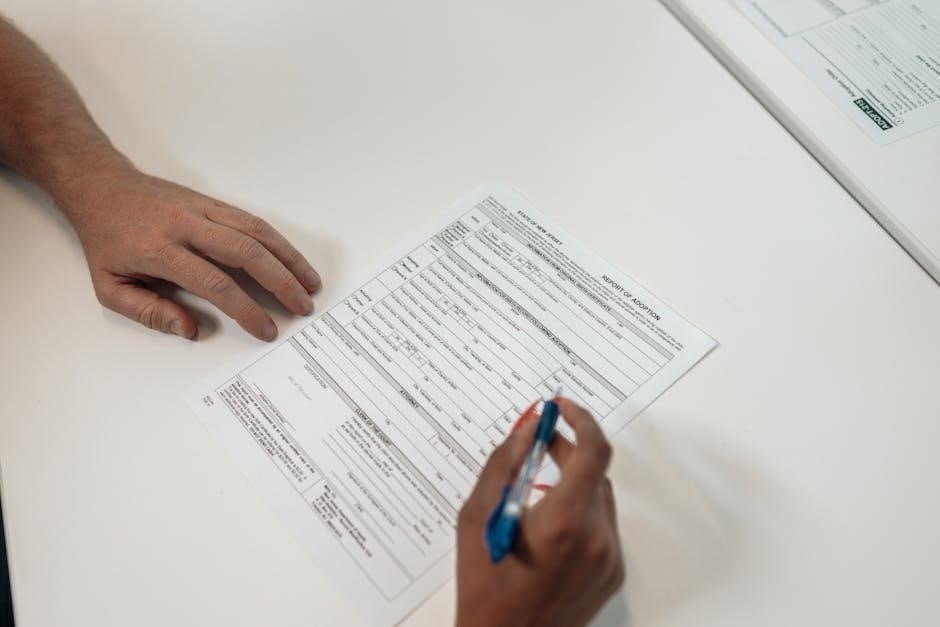A Virginia Power of Attorney (POA) is a legal document allowing individuals to appoint an agent to manage their financial, medical, or personal affairs. Available in PDF formats, these forms ensure seamless decision-making authority, providing peace of mind for residents.
1.1 Definition and Purpose
A Virginia Power of Attorney (POA) is a legal document that enables individuals to grant authority to another person, known as an agent, to act on their behalf in financial, medical, or personal matters. The purpose of a POA is to ensure continuity in decision-making, particularly in cases of incapacity or unavailability. It allows the principal to specify the scope of powers, providing peace of mind and maintaining control over their affairs. Available in PDF formats, these forms are essential for planning and protecting one’s interests effectively.
1.2 Importance of Having a Power of Attorney in Virginia
Having a Power of Attorney in Virginia is crucial for ensuring that your financial, medical, and personal affairs are managed according to your wishes if you become incapacitated. It allows you to appoint a trusted agent to act on your behalf, avoiding costly court interventions. A Virginia POA is essential for maintaining control over your life, protecting your assets, and ensuring seamless decision-making in unforeseen circumstances. It provides peace of mind and guarantees that your best interests are prioritized, aligning with Virginia’s legal requirements for such documents.

Types of Power of Attorney in Virginia
Virginia offers various Power of Attorney forms, including General, Special, Medical, Tax, and Motor Vehicle POAs, each tailored to specific needs and circumstances.
2.1 General Power of Attorney
A General Power of Attorney in Virginia grants an agent broad authority to manage the principal’s financial and personal affairs. This includes handling bank accounts, real estate transactions, and legal matters. The agent can act on behalf of the principal in various situations, providing flexibility and convenience. It is commonly used for everyday decision-making or when the principal is unavailable. The Virginia Power of Attorney form PDF outlines the scope of powers, ensuring clarity and legal compliance. It is essential for the agent to act in the principal’s best interests at all times.
2.2 Special Power of Attorney
A Special Power of Attorney in Virginia grants an agent authority to handle specific tasks or decisions, such as managing real estate transactions, overseeing business operations, or handling tax matters. Unlike a general POA, it is limited in scope and duration, ensuring the agent’s powers are restricted to predefined areas. This form is ideal for individuals needing temporary or targeted assistance. Available in PDF formats, it provides clarity and legal assurance for both parties involved, ensuring tasks are executed as specified.
2.3 Medical Power of Attorney
A Medical Power of Attorney in Virginia allows individuals to appoint an agent to make healthcare decisions on their behalf if they become incapacitated. This document ensures that personal medical preferences are honored, including decisions about treatments, surgeries, or end-of-life care. The agent must act in the principal’s best interests, as required by Virginia law. The form is available in PDF format and must be notarized to be legally binding. It provides peace of mind by ensuring continuity in medical care when the principal cannot communicate their wishes.
2.4 Tax Power of Attorney
A Tax Power of Attorney in Virginia allows individuals to appoint an agent to handle tax-related matters, such as filing returns, managing audits, and resolving tax disputes. Specific forms like Form PAR 101 and Form CC-1619 are used for this purpose. The agent must act in the principal’s best interests, ensuring compliance with state and federal tax laws. This POA is essential for individuals needing assistance with tax affairs due to incapacity or convenience. Proper notarization and execution are required to validate the document under Virginia law.
2.5 Motor Vehicle Power of Attorney
A Motor Vehicle Power of Attorney in Virginia allows individuals to grant authority to another person or entity to handle specific tasks related to their vehicles. This includes title transfers, registrations, and other DMV-related matters. The agent can act on behalf of the principal for tasks like buying, selling, or managing motor vehicles. This form is particularly useful for those who cannot handle these transactions themselves. It ensures smooth processing of vehicle-related affairs, providing convenience and legal compliance. The form can be downloaded as a PDF and completed according to Virginia’s specific requirements.

Key Elements of a Virginia Power of Attorney Form
The form includes the principal’s and agent’s details, scope of authority, effective date, revocation clause, and notarization requirements, ensuring legal validity and clear responsibilities.
3.1 Principal and Agent
In a Virginia Power of Attorney, the principal is the individual granting authority, while the agent (or attorney-in-fact) is the person authorized to act on their behalf. The principal must have the legal capacity to execute the document, understanding its nature and implications. The agent’s role is to manage the principal’s affairs, such as financial decisions, medical choices, or property transactions, always acting in the principal’s best interests. The relationship is fiduciary, requiring the agent to maintain loyalty and avoid conflicts of interest. The document outlines the scope of the agent’s authority, ensuring clarity in their responsibilities.
3.2 Scope of Authority
The scope of authority in a Virginia Power of Attorney outlines the specific powers granted to the agent. This includes managing financial transactions, real estate decisions, and tax matters. Medical POAs allow agents to make healthcare decisions, while special POAs cover specific tasks like motor vehicle transactions. The document must clearly define the extent of the agent’s authority to ensure clarity and prevent disputes. Principals can tailor the scope to their needs, granting either broad or limited powers. This section is crucial for establishing the agent’s role and responsibilities effectively.
3.3 Effective Date and Duration
The Virginia Power of Attorney form specifies when it becomes effective and how long it lasts. The principal can set a specific start date or make it immediate. It can be durable, remaining in effect until revocation or death, or limited to a specific timeframe. The document must clearly outline its duration to avoid ambiguity. A “springing” POA, which only takes effect under certain conditions, is also an option. Properly defining the effective date and duration ensures the agent’s authority aligns with the principal’s intentions.
3.4 Revocation Clause
A revocation clause in a Virginia Power of Attorney allows the principal to terminate the agent’s authority at any time. The revocation must be in writing and notarized to ensure legality. The principal retains the right to revoke the POA, even if the document states otherwise. Proper notification to the agent and any relevant third parties is essential to avoid conflicts. This clause provides flexibility, enabling the principal to reassess their needs and modify or end the agreement as circumstances change.
3.5 Notarization Requirements
In Virginia, notarization is a legal requirement for a Power of Attorney to be valid. The principal must sign the document in the presence of a notary public, who verifies their identity and mental capacity. This step ensures the authenticity and enforceability of the POA. Failure to meet notarization requirements can render the form invalid, potentially causing delays or legal challenges. Proper notarization is essential to uphold the integrity of the agreement and protect the rights of all parties involved.

How to Complete a Virginia Power of Attorney Form

Download the Virginia Power of Attorney form PDF, fill in personal details, define powers, and ensure signatures, witnesses, and notarization are properly completed for legal validity.
4.1 Downloading the Form
Downloading a Virginia Power of Attorney form is straightforward. Official state websites, such as the Virginia Supreme Court or Department of Taxation, offer free PDF templates. Legal aid resources and online platforms also provide downloadable forms. Ensure the form aligns with your needs, such as financial, medical, or tax matters. Forms like CC-1619 are available as revisable PDFs, allowing users to fill them out electronically before printing. Always verify the form’s authenticity and compliance with Virginia state laws to ensure validity.
4.2 Filling in Personal Information
Accurately completing the personal information section is crucial for the validity of the Virginia Power of Attorney form. Ensure the principal’s full name, address, and date are clearly entered. The agent’s details, including name and contact information, must also be provided. Specific sections may require additional information, such as the principal’s date of birth or Social Security number. Legibility is key to avoid confusion. Both the principal and agent must sign the document, with witnesses also providing their details if required. Using a PDF editor can help ensure all fields are filled correctly and neatly.
4.3 Defining Powers and Responsibilities
When completing a Virginia Power of Attorney form, it is essential to clearly define the powers and responsibilities granted to the agent. This section outlines the specific authority, such as managing financial transactions, making medical decisions, or handling tax filings. The principal must specify whether the agent has broad or limited powers, ensuring clarity in decision-making. Agents are legally required to act in the best interests of the principal, and this section ensures transparency and accountability in their role. Properly defining these aspects is crucial for the document’s effectiveness.
4.4 Signature and Witness Requirements
The principal must sign the Virginia Power of Attorney form in the presence of a notary public and two witnesses. The witnesses must be adults and cannot be the agent or related to the principal. The principal’s signature confirms their understanding and consent, while witnesses attest to the principal’s capacity. Notarization ensures the document’s authenticity. Proper execution is essential for the POA to be legally binding, protecting all parties involved and preventing future disputes.
4.5 Notarization Process
The notarization process for a Virginia Power of Attorney involves the presence of a licensed notary public. The principal must sign the document in the notary’s presence, confirming their capacity to execute the form. The notary verifies the principal’s identity and witnesses the signature before stamping and sealing the document. This step ensures the form’s authenticity and legal validity. Proper notarization is essential for the POA to be enforceable under Virginia law, protecting both the principal and the agent. Witnesses may also be required, depending on the specific circumstances or form type.

Legal Requirements in Virginia
Under Virginia law, the principal must have the capacity to understand the document, and the agent must act in their best interests, adhering to state-specific legal standards.
5.1 Capacity to Execute a Power of Attorney
Under Virginia law, a principal must have the mental capacity to understand the nature and implications of executing a Power of Attorney. This means the individual must be at least 18 years old and of sound mind. The document must be signed voluntarily, free from coercion or undue influence. The principal’s capacity is confirmed through the notarization process, ensuring the POA is legally valid and enforceable. This requirement protects the principal’s rights and ensures their autonomy in delegating authority to an agent.
5.2 Role and Responsibilities of the Agent
The agent designated in a Virginia Power of Attorney holds a fiduciary duty to act in the principal’s best interests. They are responsible for managing financial affairs, making medical decisions, and handling specific tasks as outlined in the document. The agent must act with loyalty, avoiding conflicts of interest, and follow the principal’s instructions. They are also required to keep accurate records and provide accountings when requested. Under Virginia law, the agent’s authority is limited to the powers granted in the POA form, ensuring they act within legal boundaries to protect the principal’s rights and assets.
5.3 State-Specific Laws and Regulations
Virginia has specific laws governing Power of Attorney forms, ensuring they align with state regulations. The agent must act in the principal’s best interests, as mandated by Virginia law. Forms like CC-1619 are commonly used for legal processes. The state requires clear definitions of authority and proper execution procedures. Compliance with these laws is essential to maintain the document’s validity and enforceability. Understanding Virginia’s legal framework helps ensure the Power of Attorney functions effectively within the state’s guidelines.
Common Mistakes to Avoid
- Incorrect or missing information can invalidate the form.
- Failure to notarize properly leads to legal issues.
- Insufficient witness signatures can delay processing.
6.1 Incorrect or Missing Information
One of the most common mistakes when completing a Virginia Power of Attorney form is providing incorrect or missing information. This can include typos in names, addresses, or dates, which may lead to legal challenges. Ensure all details, such as the principal’s and agent’s full names, are accurately filled out. Omitting critical sections, like the scope of authority or effective dates, can render the document invalid. Double-checking the form before notarization is essential to avoid delays or legal complications.
6.2 Lack of Proper Notarization
One common mistake is failing to properly notarize the Power of Attorney form. In Virginia, notarization is legally required to validate the document, ensuring its enforceability.
Without proper notarization, the form may be deemed invalid, leading to legal challenges. Always ensure a certified notary witnesses the signing and stamps the document to avoid this critical error.
6.3 Insufficient Witness Signatures
One common mistake is failing to obtain the required number of witness signatures, which can render the Power of Attorney invalid. In Virginia, a POA typically requires two witnesses to confirm the principal’s capacity and voluntary execution. Witnesses must be present when the principal signs the document. If signatures are missing or incomplete, the form may not be recognized by institutions or authorities. Always ensure all witness sections are filled out correctly to avoid delays or legal challenges in enforcing the document.

Frequently Asked Questions
Common questions include whether one can create their own POA, the time required to complete the form, and if a POA can be revoked in Virginia.
7.1 Can I Create My Own Power of Attorney?
Yes, you can create your own Power of Attorney in Virginia using a PDF form. These forms are widely available online and cover financial, medical, and tax matters. While it’s possible to draft one yourself, consulting a legal professional is recommended to ensure compliance with state laws and accuracy. The document must be notarized and witnessed properly to be legally binding. Virginia law requires the principal to have the capacity to understand the document’s nature and implications when signing.
7.2 How Long Does It Take to Complete the Form?
Completing a Virginia Power of Attorney form typically takes 15–30 minutes for straightforward cases. The process involves downloading the PDF, filling in personal details, defining powers, and securing signatures. More complex forms or situations requiring legal advice may take longer. Ensure all information is ready beforehand to save time. Reviewing and notarizing the document are final steps, which can be done efficiently if prepared. Plan accordingly to avoid delays and ensure accuracy.
7.3 Can I Revoke a Power of Attorney?
Yes, a Power of Attorney can be revoked in Virginia. To revoke a POA, the principal must create a written revocation document, which should be notarized for validity. The agent and any relevant parties, such as financial institutions, must be notified of the revocation. Once properly executed, the agent’s authority is terminated. It’s essential to consult an attorney to ensure the revocation process complies with Virginia law and is legally binding. This step ensures the principal regains control over their affairs immediately.

Where to Find Virginia Power of Attorney Forms
Virginia Power of Attorney forms are available on official state websites, legal aid resources, and online legal platforms, offering convenient access to downloadable PDF versions.
8.1 Official State Websites
Official state websites are reliable sources for obtaining Virginia Power of Attorney forms. The Virginia Tax Department and Supreme Court website offer downloadable PDF forms, such as PAR 101 and CC-1619. These platforms provide authentic and up-to-date documents, ensuring compliance with state laws. Users can access forms for financial, medical, and tax-related matters directly from these trusted sources. Official websites also include instructions and guidelines, making the process straightforward for residents.
8.2 Legal Aid Resources

Legal aid resources in Virginia provide free or low-cost assistance for individuals needing a Power of Attorney form. Organizations like Legal Aid Societies offer guidance and forms for those who cannot afford legal representation. Law school clinics and nonprofit groups also provide support, ensuring access to necessary documents. These resources help individuals understand and complete the Virginia Power of Attorney form PDF accurately, addressing specific needs and ensuring compliance with state laws.
8.3 Online Legal Platforms
Online legal platforms offer convenient access to Virginia Power of Attorney forms in PDF format. Websites like LegalZoom, Rocket Lawyer, and LawDepot provide downloadable templates tailored to Virginia state laws. These platforms often include guides for completing the forms, ensuring compliance with legal requirements. Users can select from various types of POA, such as general, special, or medical, and customize them to suit their needs. This method is cost-effective and time-saving, making it a popular choice for individuals seeking efficient legal solutions.
Using the Virginia Power of Attorney Form
The Virginia Power of Attorney form enables agents to handle financial transactions, make medical decisions, manage tax filings, and conduct motor vehicle transactions on behalf of the principal.
9.1 Financial Transactions

A Virginia Power of Attorney allows agents to manage financial transactions, including bank accounts, investments, and real estate. They can pay bills, file taxes, and conduct transactions on behalf of the principal. This authority ensures financial stability and continuity. Agents must act in the principal’s best interests, as required by Virginia law, maintaining transparency and accountability in all financial decisions.
9.2 Medical Decisions
A Medical Power of Attorney in Virginia allows the designated agent to make healthcare decisions on behalf of the principal. This includes decisions about treatments, medications, and end-of-life care. The agent must act in the principal’s best interests, adhering to their wishes as outlined in the document. The form ensures continuity of care when the principal is unable to communicate. It is legally binding and requires proper execution, including notarization, to validate the agent’s authority in medical matters.
9.3 Tax Filing and Management
A Virginia Power of Attorney allows agents to handle tax-related matters, including filing returns and managing audits. The Virginia Tax Power of Attorney form enables representatives to act on behalf of individuals or businesses, ensuring compliance with state and federal tax laws. This form is essential for delegating authority to a trusted agent to oversee tax obligations, providing peace of mind for residents. It can be submitted to the Virginia Department of Taxation at P.O. Box 1115, Richmond, VA 23218-1115, with a fax number of (804) 254-…
9.4 Motor Vehicle Transactions
A Virginia Power of Attorney can be used to handle motor vehicle transactions, such as buying, selling, or transferring ownership of vehicles. The agent can also manage title changes, registrations, and lien releases. This authority is particularly useful if the principal is unable to handle these matters personally. Specific forms, like the Motor Vehicle Power of Attorney, are available to grant agents the necessary powers for such transactions, ensuring legal compliance and streamlined processes in Virginia.
Conclusion
A Virginia Power of Attorney form ensures legal authority for decision-making, offering peace of mind. Downloading a PDF form and consulting professionals guarantees proper execution and compliance with state laws.
10.1 Final Thoughts
A Virginia Power of Attorney form is a vital tool for ensuring your interests are protected and decisions are made according to your wishes. Whether for financial, medical, or other matters, having a POA in place provides peace of mind. The availability of these forms in PDF format makes the process accessible and straightforward. By appointing a trusted agent, you can rest assured that your affairs will be managed responsibly, even when you cannot act on your own behalf.
10.2 Next Steps
After completing the Virginia Power of Attorney form, ensure it is properly notarized and witnessed. File copies with relevant authorities, such as your bank or healthcare provider. Review the document annually to update as needed. Store the original securely and inform your agent of its location. Consider consulting a legal expert for complex situations. Finally, ensure all parties understand their roles and responsibilities to avoid future disputes. This ensures your wishes are respected and your affairs are managed smoothly.
